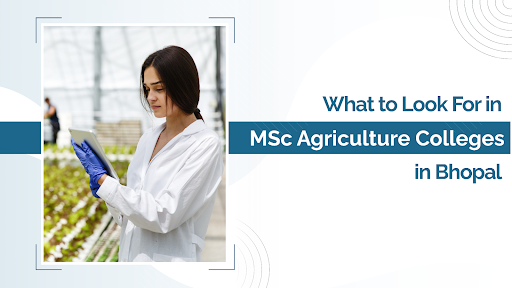You have just finished your BSc in Agriculture, and while everyone else is planning their job hunt or prepping for government exams, you’re eyeing something bigger, an MSc Agriculture. You don’t want to be just another graduate; you want to be the person who breaks yield records, develops drought-resistant crops, or revolutionizes farming finance. And Bhopal? It’s where central India’s agricultural heartbeat is strong.
Choosing the right college isn’t just about prestige; it’s about finding a place where labs hum with innovation, where mentors wake you up at 6 AM for field trials, and where your research could reshape how farmers cultivate their land.
This guide dives into why MSc matters, the hallmarks of a top-tier MSc institution in Bhopal, and where your degree can take you next.
What Makes MSc Agriculture Programs Valuable?
An MSc is not “more of the same.” It’s a step into specialization, innovation, and field-changing research.
Advanced Subjects
If your undergraduate syllabus covered the basics, soil science, crop botany, and entomology, then MSc is where things deepen and get serious:
Molecular Plant Breeding
You will go beyond Mendelian genetics to study genomics-assisted breeding, CRISPR gene editing, quantitative trait locus (QTL) mapping, and marker-assisted selection (MAS). This is how modern crops are engineered for:
- Drought tolerance
- Pest resistance
- Nutrient enhancement (e.g., zinc-rich wheat, iron-fortified rice)
You will work with real datasets, using PCR and gel electrophoresis, and may even participate in collaborative projects with biotech labs or ICAR-supported research units.
Precision Farming Technologies
This subject blends agronomy, engineering, and data science to optimize farm input usage:
- GIS & GPS Mapping: For soil zoning and precision seeding
- IoT Sensors & Drones: Monitor crop health, moisture levels, and nutrient deficiency in real-time
- Variable Rate Technology (VRT): Adjust fertilizer or irrigation application with pinpoint accuracy
- Farm Management Software (FMS): Learn to simulate crop planning and forecast productivity
These tools aren’t just the future; they’re in use today, and you’ll be trained to deploy them.
Agro-Ecology & Sustainable Agriculture
As environmental stress rises, sustainable agriculture becomes essential:
- Low-input farming systems
- Organic nutrient cycles using compost, green manure, and biofertilizers
- Agroforestry & Crop rotation systems
- Climate-smart agriculture techniques, including zero tillage and cover cropping
You will analyze life cycle assessments (LCAs), explore carbon sequestration models, and study IPM (Integrated Pest Management) frameworks that reduce the use of synthetic chemicals.
Agri-Food Processing and Value Addition
India loses about 30–40% of its fresh produce post-harvest. MSc Ag programs prepare you to fix that:
- Study food preservation, dehydration, fermentation, and packaging techniques.
- Learn to run quality control labs with parameters like moisture content, microbial load, and shelf-life prediction.
- Gain skills in developing market-ready products like millet-based health mixes, solar-dried fruit snacks, or shelf-stable vegetable pastes.
- Understand FSSAI regulations and cold chain logistics.
In top colleges, this subject is backed by hands-on factory simulations and visits to agro-processing plants.
Farm Business Management & Agripolicy
This is the brain of the operation. Agriculture isn’t just science, it’s economics, leadership, and law:
- Master cost-benefit analysis, farm budgeting, risk management
- Learn agri-financing through NABARD, Kisan Credit Cards, and cooperative banking systems
- Understand WTO agreements, MSP policies, subsidies, and export-import dynamics
- Analyze the role of eNAM (National Agriculture Market), FPOs (Farmer Producer Organizations), and agri-startups
You will also learn to prepare project feasibility reports—vital for launching your agri-enterprise or applying for funding.
You are not just memorizing, you’re dissecting, debating, and building solutions.
Research Opportunities
This is where the MSc becomes your launchpad into real-world impact:
- Individual Research Projects: You will propose and run experiments, from cross-breeding to yield trials.
- Collaborative Studies: Work with NGOs, government bodies, and biotech firms. In Bhopal, many colleges partner with ICAR, DBT, or startup incubators.
- Publications & Presentations: Top colleges encourage students to publish findings or present at conferences like NAAS seminars. There’s nothing quite like the rush of finally explaining your thesis to an audience.
- Pilot Programs: Conduct village-level trials for sustainable irrigation or pest-resistant crops. You become a mini-champion—bringing science home.
This is your chance to push boundaries—and leave a mark.
Key Features of Good MSc Agriculture Colleges in Bhopal
With the “why” clear, let’s look at the “where.” What makes an MSc college stand out?
Lab Infrastructure and Field Facilities
You have got the theory, now where will you practice it? Top Colleges in Bhopal feature:
- State-of-the-art molecular labs: PCR machines, gene sequencers, tissue culture rooms.
- Soil & water testing units: On-campus systems for nutrient testing, salinity trials, etc.
- Smart greenhouses: Controlled-environment rooms for precise experiments.
- On-site experimental farms: Acres of test plots for crop, vegetable, or cash crop research.
- Drone and remote-sensing facilities: Letting you learn aerial mapping and NDVI analysis.
It’s one thing to read about variable-rate irrigation—you need to see swirls of sprinklers in action at dawn to truly get it.
Faculty Expertise and Industry Partnerships
Even the best labs are empty without mentors and networks to guide you. Here’s what to look for:
- Doctoral-level senior faculty with published papers and real-world projects.
- Visiting professors from ICAR or agri-tech startups, who bring fresh insights.
- Research-collab partnerships: Certain colleges in Bhopal host biotech firms or seed companies on campus.
- Active MoUs: Especially with startups offering data-driven agriculture tools, or agribusiness firms testing new products.
- Student leadership: A good college empowers students to design research, not just execute it.
Colleges like Mansarovar Global University support students co-publishing with faculty, and research collaborations in frontier agricultural sciences.
Career and Research Opportunities After MSc Agriculture
So you have dug into DNA, run field trials, and published papers. Now what? Your MSc degree is your golden ticket—but where does it lead?
Common Roles for MSc Agriculture Graduates
Here’s how your value map expands:
| Role |
What You Do |
Typical Employers |
| Research Scientist |
Design and conduct crop trials, soil studies |
ICAR institutes, seed companies like Syngenta |
| Agri-Consultant |
Advise on farm productivity and crop management |
Startups, cooperative banks |
| Precision Agri Specialist |
Use drones and sensors for yield optimization |
Agritech firms, tech startups |
| Crop Breeder |
Develop hybrid or disease-resistant varieties |
Government labs, seed companies |
| Quality Control Officer |
Ensure food safety and compliance standards |
Food processing industries |
| University Faculty / Lecturer |
Teach and guide new students |
Agricultural universities, colleges |
| Extension Officer |
Train farmers on-site in improved methods |
State Agri departments, NGOs |
This degree bumps your entry salary significantly—often ₹6–8 LPA initially, with brokering projects or research grants reaching ₹12–15 LPA.
Scope for PhD and International Research
Not done yet? Science never lets you rest:
- PhD in Agricultural Sciences: Pursue areas such as plant physiology, crop genetics, or agro-ecology.
- Post-Doctoral Fellowships: From ICAR, UGC, CSIR, or even overseas programs.
- International Opportunities: Collaborations or positions in countries practicing advanced agri-tech—Israel, Netherlands, USA.
- Global Conferences & Journals: Presenting your research globally, networking with peers, and shaping policy at a UN FAO meeting one day.
Institutions like Mansarovar Global University actively support this route—helping students apply for fellowships abroad and rewarding scholarly achievements.
Summing Up
Earning an MSc Agriculture in Bhopal is not just advanced education, it’s the beginning of purposeful innovation.
Here’s why it matters:
- You are not just learning; you are solving drought, boosting yields, and protecting livelihoods.
- You are not just studying; you are leading sustainability.
- You are not just choosing a course; you are crafting a career that feeds both India and potentially the world.
So if you are ready to roll up your sleeves for lab experiments at dawn and field trials at dusk and drive professional change then choosing the right MSc college in Bhopal can be your launchpad.
Look for those labs that buzz with possibility, faculties that challenge and guide, and support systems that help your ideas grow roots.
This isn’t just about a master’s degree. This is about mastering the earth itself. And Bhopal is waiting.




